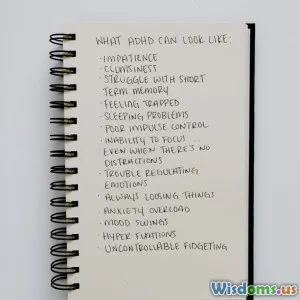
Strategies for Effective Goal Setting
7 min read Unlock your potential with proven strategies for effective goal setting in personal development and psychology. (0 Reviews)
Strategies for Effective Goal Setting: Unlocking Personal Growth
Introduction
Setting goals is often the first step toward achieving meaningful personal growth and psychological well-being. But why do some people seem to effortlessly accomplish their dreams while others struggle with motivation and follow-through? The secret lies not in wishful thinking but in effective goal setting. It's not just about writing down desires; it’s a psychological framework backed by research that channels intention into productive action.
In this article, we will uncover the scientifically-proven and practical strategies for crafting and achieving goals that empower lasting development. From defining clear objectives and leveraging motivation to real-world techniques for tracking progress, these insights will illuminate how to structure your goals for maximum impact.
The Psychology Behind Goal Setting
Before diving into strategies, it’s vital to understand the psychological basis behind why goal setting works. According to Locke and Latham’s Goal Setting Theory, setting specific and challenging goals leads to higher performance compared to vague or easy goals. Goals focus attention, mobilize effort, increase persistence, and motivate strategy development.
Furthermore, neuroscience reveals that achieving goals stimulates dopamine production—the brain’s reward chemical—creating a positive feedback loop that encourages continued effort. This interplay between clear objectives and intrinsic motivation underscores why strategic goal setting is a cornerstone of personal development.
1. Define Clear, Specific, and Measurable Goals
Vagueness is the enemy of progress. Instead of "I want to be healthier," a precise goal might be, "I want to run a 5k race in under 30 minutes within 3 months."
Why specificity matters:
- Clarity directs action: Clear goals frame what needs to be done.
- Measurability enables feedback: Knowing exactly what success looks like helps you track progress.
Example: Olympic athletes meticulously set performance benchmarks during training rather than vague ambitions.
Use the SMART framework as a guideline:
- Specific: Define exactly what you want.
- Measurable: Attach metrics to monitor.
- Achievable: Ensure it’s realistic.
- Relevant: Align with broader life purposes.
- Time-bound: Set deadlines to create urgency.
2. Break Down Large Goals into Manageable Subgoals
Big goals can feel overwhelming; this invokes procrastination or paralysis. Breaking goals into smaller, actionable steps transforms daunting tasks into achievable milestones.
Psychological benefits:
- Reduces cognitive load: Smaller chunks are easier to process and tackle.
- Provides frequent wins: Accomplishing subgoals creates motivation via incremental success.
Example: If your goal is to write a book within six months, break it down into monthly word count targets, weekly chapter outlines, and daily writing sessions.
3. Cultivate Intrinsic Motivation by Linking Goals to Personal Values
Long-term commitment is anchored in intrinsic motivation—doing something because it aligns with your core values or brings meaningful satisfaction.
How to connect goals to personal values:
- Reflect on why the goal matters to you.
- Visualize how achieving it improves your life or aligns with your identity.
Research insight: A 2017 study in the Journal of Personality and Social Psychology found that people persist longer when goals resonate with their intrinsic values, compared to extrinsic rewards like money or status.
Example: Instead of losing weight just for appearance, frame it as improving health for your family and personal longevity.
4. Utilize Positive Affirmations and Visualization
Leveraging mental rehearsals can reinforce belief in achieving goals and enhance actual performance.
What science says:
- Studies in Psychological Science show athletes who practice mental visualization perform better in real competition.
- Affirmations help counter self-doubt by reaffirming commitment.
Try visualizing yourself completing each step of your goal, feeling the excitement and satisfaction. Repeat encouraging affirmations aligned with your objectives daily to fortify motivation and resilience.
5. Establish Accountability Mechanisms
Accountability increases the likelihood of goal achievement by introducing external or social commitments.
Strategies include:
- Sharing goals with friends, mentors, or support groups.
- Using apps that track progress and send reminders.
- Enlisting a coach or accountability partner.
Example: The annual "No-Shave November" campaign exemplifies social accountability motivating millions through community support.
6. Monitor Progress and Adjust Accordingly
Regular progress reviews are essential. They provide feedback, reinforce motivation, and allow course corrections.
Tips for effective monitoring:
- Maintain journals or digital logs.
- Reflect on obstacles and successes.
- Adjust timelines or break down further if needed.
Real-world insight: Companies like Google deploy OKRs (Objectives and Key Results) which encourage continuous evaluation and flexibility in goals, fueling innovation and performance.
Conclusion: Commit to Consistent, Purposeful Goal Setting
Goal setting is more than wishful thinking—it's a dynamic, psychological process that transforms abstract desires into tangible achievements. By crafting clear, measurable objectives; breaking them into actionable subgoals; aligning with your intrinsic motivations; harnessing visualization; building accountability; and continuously monitoring progress, you create a powerful roadmap to personal growth.
Remember the words of Earl Nightingale: "People with goals succeed because they know where they're going." Make your goals your compass, and step confidently towards becoming the best version of yourself.
Ready to set your next goal? Start now with clarity, and let these strategies guide your journey.
Rate the Post
User Reviews
Popular Posts





















